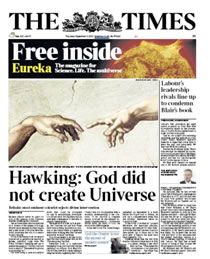Newton, science and God
Why are we here?
Long ago the answer seemed obvious. A universe can’t come from nowhere and it can’t make itself … so clearly it was made by an amazing deity.
How things have changed. Now we think the universe did come from nowhere. And scientists seem to be saying it did make itself. Ouch!
What does this mean for people who believe in God? Is there nothing left for God to do? Does God (if we think He exists at all) sit back and watch while it all happens? Has God been squeezed out by science?
Newton – before the apple struck
Newton loved puzzles. As a child, he was the type who leans into the wind with his coat flaps held out to the sides to see how far he can lean before he topples over.
Many years later, Newton was trying to fathom out another puzzle. For some reason, the planets don’t fly off into space, they orbit around the Sun. But why? What is the force which holds the planets in their orbits?

It seems really obvious now but that’s just because we know the answer. Newton didn’t.
So there he was, puzzling away, sitting under a tree and … yes, you’ve guessed it. Thump! That famous apple lands on his head.
“Gravity!” cried Newton, “The force that pulls planets to the Sun is the same force as the one that pulls apples to the ground.”
What a mental leap!
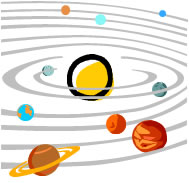
It’s hard for us to realise now what a huge leap of mind this was. Newton was saying that a force that we only experience here on the Earth was also at work in space at a planetary level.
The force between planets didn’t need to be gravity; it could have been a new force that just operates in space, called, er, FPA short for Force of Planetary Attraction.
Newton’s God
But Newton said, “It’s got to be gravity, and here’s why: God is a superb designer and he wouldn’t go and invent two forces to do a job, when actually one will do the trick very well.” Newton believed in God and gravity seemed to him to tick all the boxes. In the end, though, it didn’t matter that it was Newton’s idea of God as a master designer that brought him to his discovery. He could have realised it another way.
Einstein’s sense of wonder
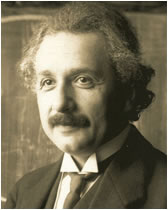 Einstein was another scientist who was thrilled by the cleverness of the Universe.
Einstein was another scientist who was thrilled by the cleverness of the Universe.
He also talks about ‘God’ the designer, but in his mind, this is not a personal God you pray to.
This was a word to describe the feeling that scientists have when they study nature, whether or not they are religious, that it is wonderfully neat and clever.
Dawkins’ admiration of nature
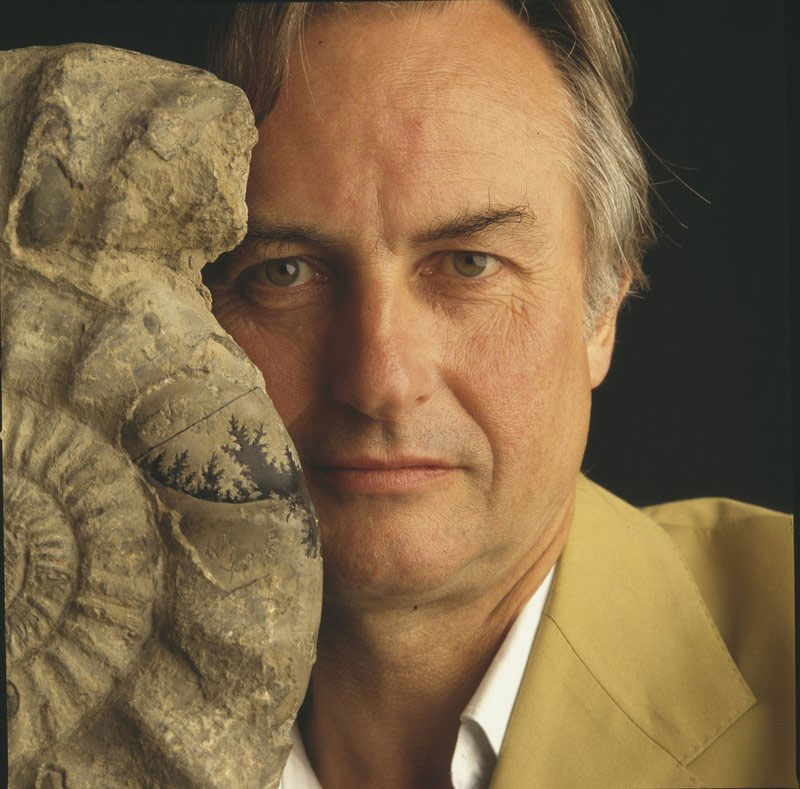
Scientist, Richard Dawkins, who is famously an atheist says, he feels this sense of wonder too, but again in his mind, it has nothing to do with a supernatural god.
He says,
A quasi-mystical response to nature and the universe is common among scientists and rationalists. It has no connection with supernatural belief.” (p.11)
(Continued top of Column two)
Hawking: man of mystery
Another famous scientist, Stephen Hawking was always a bit hard to read on this one. At the end of one his books, he said that if we could puzzle our way through a few more of the big mysteries that science has not yet solved,
“Then we will know the mind of God.”
Readers got very excited. Which kind of God did Hawking mean? Was he talking about the kind of god that all scientists sort-of believe in, when they admire the cleverness of nature? Or did Hawking mean a God like the God you read about in religious texts – a God who cares about people and who wants the Universe to exist?
Hawking has just written another book and now he has set the record straight. He says he is an atheist and he does not believe in a Creator who intentionally made the Universe the way it is.
Did God create the universe?
In fact the headlines that appeared in newspapers and on TV when Hawking’s new book came out were striking to say the least.
On the front page of the ‘Times’ newspaper on September 2nd 2010, it said:
Hawking: God did not create the universe
Wow, that’s pretty blunt! In the text we read that Hawkins said,
“Because there is a law such as gravity, the universe can and will create itself from nothing … It is not necessary to invoke God to light the blue touch paper and set the universe going.”
The role for God seems to be shrinking
Gosh, this seems conclusive then. We don’t need God in order to explain why there is a universe. God is er … squeezed out of the picture.
Or is he? When we say ‘God is squeezed out of the picture’, we now need to think about which picture this is which God is being squeezed out of.
Newton called on God on another occasion in his work. He was trying to explain the orbital paths of the planets. Why do they hold their orbits so perfectly and across such a long period of time?
He came up with an ingenious solution. Perhaps sometimes the planets do stray a little but then God nudges them to get them back on course.
Oops
This turned out to be a mistake. Not much later, scientists found ways to explain the planets’ orbits and they didn’t seem to need any nudging by God.
History tells us that it is usually a mistake when scientists fix gaps in their understanding by calling on God or by using another kind of quick-fix solution.
Mysteries and gaps in science do not require sticky tape solutions, they need to be investigated.

Einstein made a similar mistake when he invented a constant to make an equation work the way he wanted it to. He called this constant, the Cosmological Constant.’
Later Einstein said that inventing this Cosmological Constant and putting it into his equation had been a huge blunder.
What God … doesn’t do
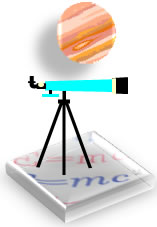 That is the message of the headline in the Times newspaper. Don’t believe in a God who fills the gaps in science … because your God will disappear!
That is the message of the headline in the Times newspaper. Don’t believe in a God who fills the gaps in science … because your God will disappear!
The so-called ‘God of the Gaps’ is unpopular with scientists who do not believe in God, and also with those who do.
Scientists who believe in God say that the more science discovers and the more gaps it fills, the more this confirms their ideas about the kind of God they believe in.
“Nature works perfectly, with no need for fixing”
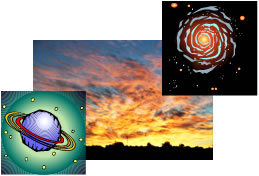 Why would God choose to fix creation with unscientific solutions, they say.
Why would God choose to fix creation with unscientific solutions, they say.
In their view, the more splendid solution is to make it work perfectly in ways that science can describe.
Deism is the view that God created the Universe long ago and now leaves it to run. Some religious scientists are Deists, others are Theists, believing that God interacts with people.
Further reading: article by Eric Priest on ‘why are we here?’ [downloads in Word]
Next: God and miracles
